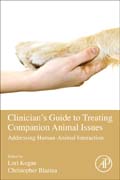
Clinicians Guide to Treating Companion Animal Issues: Addressing Human-Animal Interaction
Kogan, Lori R.
Blazina, Christopher
Clinician's Guide to Treating Animal Companion Issues: Addressing Human-Animal Interaction is the first of its kind-a groundbreaking resource for mental health professionals who want the knowledge, skills and awareness to successfully work with pet-owning clients. The book trains clinicians across multiple disciplines to feel more comfortable and confident addressing companion-related issues-both when those issues are the primary reason for seeking therapy or a critical component in better understanding client needs. The book uses current human-animal interactions theories as a foundation to explore pet-related issues utilizing behavioral, cognitive behavioral, family systems, humanistic and contemporary psychodynamic therapeutic orientations. Users will find sections on the many issues that arise during the lifespan of pet owners (e.g., children, young adults, elderly), as well as issues pertinent to specific populations (e.g., men, homeless, ethnically diverse). Additional topics include the violence link, pet death and bereavement, and behavioral issues. As the first book to approach human-animal interactions (HAI) from a multi-theoretical perspective, it helps clinicians appropriately acknowledge and incorporate relevant HAI issues within therapy to achieve goals. Provides practical information for immediate use in practiceFocuses on common issues relating to companion animalsAddresses bereavement, attachment, behavior, and moreIncludes interactive readings, case studies and therapeutic exercisesContains multiple theoretical orientations (behavioral, cognitive behavioral, family systems, humanistic and psychodynamic approaches) INDICE: 1. The human animal bond over the lifespan: A primer for mental health professionals2. Animals and children's development: Expanding the circle for psychotherapy3. Dog Bites to Children: Family Interventions and Prevention Strategies4. Adolescents and Pets5. Providing Guidance on Psychiatric Service Dogs and Emotional Support Animals6. Eight domains of pet-owner wellness: Implications for counselors and counselor training7. Pets and the Therapeutic Process8. Understanding Cross-Species Parenting: A Case for Pets as Children9. Caregiving for Adult Pet Owners10. The Role of Pets in the Personal Communities of People Living with Long-Term Conditions11. Pets and relationships: How animals help us understand ourselves and our connections with others12. How Connections with Companion Animals Impact Relationships with Self and Intimate Others13. Working with men and their dogs: How context informs clinical practice when the bond is present in males' lives14. Integrating Clients' Animals in Clinical Practice: Insights from an Animal-Informed Therapist15. Persons Experiencing Prolonged Grief after the Loss of a Pet16. Helping clients facing behavior problems in their companion animals17. The Dark Side? of the Human-Animal Bond18. Animal Abuse Issues in Psychotherapy19. Homelessness and Animal Companionship20. The Impact of Equine Ownership in Psychotherapy 21. Issues in serious veterinary illness and end of life care22. Considerations in counseling veterinarians: Addressing suffering in those who care for animals23. Following the loss of a companion animal: Aftercare & pet loss support24. The human-animal bond and Hispanic clients in the USA25. Pets and Human Diversity: Toward Culturally Competent, Culturally Humble Psychotherapy26. Pets and older adults - the role of occupational therapy practitioners27. Compassion Fatigue: Presenting Issues and Practical Applications for Animal Caring Professionals28. The Ethics of Competency in Human-Animal Relationships
- ISBN: 978-0-12-812962-3
- Editorial: Academic Press
- Encuadernacion: Rústica
- Páginas: 700
- Fecha Publicación: 01/09/2018
- Nº Volúmenes: 1
- Idioma: Inglés
